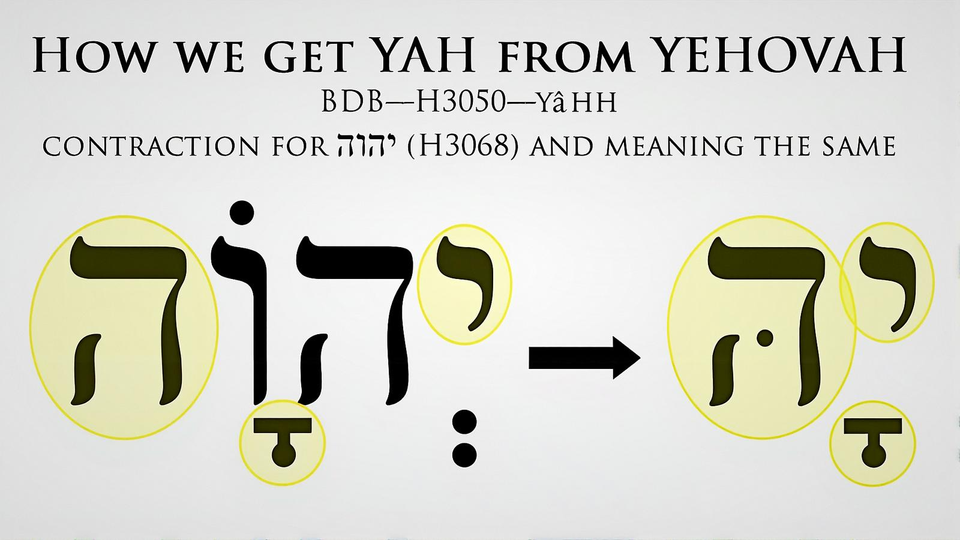How do we get Yah from YehovAH?

Many have claimed that the poetic form Yah (יה) reveals the “correct pronunciation” of the Divine Name Y’hovah (יהוה). However, this argument is based on misunderstanding both Hebrew linguistics and Scriptural usage.
No one disputes that Yah is a true reference to Y’hovah. It appears in the Tanakh, though only a few dozen times, compared to the 6,827 occurrences of the full Tetragrammaton יהוה. The abbreviated Yah occurs approximately 42 times across four books—most notably in Tehillim (Psalms), Yeshayahu (Isaiah), Shemot (Exodus), and Shir HaShirim (Song of Songs).
For example:
“Yah is my strength and song, and He has become my deliverance.”
— Shemot (Exodus) 15:2, TS2009
“Hallelu-Yah! Praise, O my being, יהוה.”
— Tehillim (Psalms) 146:1, TS2009
These verses show Yah as a poetic, shortened form—an expression of worship and praise, not a replacement of the full covenantal Name.
The Linguistic Origin of “Yah”
In Hebrew grammar, Yah (יה) is a contraction or abbreviation of Y’hovah (יהוה). The formation takes the first and last letters—yod (י) and heh (ה)—to form יה.
Phonetically, the vowel sound in Yah comes from the qamatz (ָ) under the final syllable of Y’hovah, producing the “ah” sound. This is significant: it reflects abbreviation, not invention. The divine Name is not built from Yah—rather, Yah is derived from the full Name Y’hovah.
To attempt to reconstruct the sacred Name of Y’hovah using only its poetic abbreviation Yah is, as you wisely wrote, “like the tail wagging the dog.” It reverses the divine order of revelation.
Y’hovah (יהוה) is the complete covenantal Name, while Yah (יה) is a literary and devotional shorthand—used especially in praise and song.
Theophoric Names and Their Witness
We also find Yah embedded within many Hebrew names, such as:
- Yeshayahu (Isaiah) — “Y’hovah is salvation.”
- Eliyahu (Elijah) — “My El is Y’hovah.”
- Netanyahu — “Gift of Y’hovah.”
- Yesha‘yahu — “Deliverance of Y’hovah.”
These names often appear in shortened forms ending with -yahu or -yah, depending on grammatical placement and poetic flow. Both forms point back to Y’hovah as the divine source.
However, note that when these theophoric names begin (such as Yehoshua, Yehonatan, Yehoyada), they use the Y’ho- prefix, not Ya- or Yah-. This is key linguistic evidence that the Divine Name begins with Y’ho- rather than Ya-—reinforcing that Y’hovah is the correct and complete pronunciation, not Yahweh.
Thus, “Yah” is the ending form used in poetry and names, while Y’ho- is the beginning form found in compound names—both witnessing to the fullness of Y’hovah.
Theological Meaning — Covenant Name vs. Poetic Praise
Yah expresses praise and devotion, often used in exclamations like “Hallelu-Yah” (“Praise Yah”). It communicates intimacy, awe, and worship. But Y’hovah expresses covenantal identity—the revealed Name by which Y’hovah made Himself known to Mosheh and Yisra’el:
“And Elohim said to Mosheh, ‘I am YHVH. I appeared to Avraham, to Yitzhak, and to Ya‘akov as El Shaddai, but by My Name YHVH I was not known to them.’”
— Shemot (Exodus) 6:2–3, TS2009
Y’hovah is the Name of revelation, the Name of covenant, and the Name of salvation—the same Name revealed in His Son, Y’hoshua (יהושע), meaning “Y’hovah saves.”
This divine connection between Y’hovah and Y’hoshua shows that salvation and revelation both flow from the same sacred Name. Yah may express worship, but Y’hovah reveals the person and power behind that worship.
Why “Yah” Alone Is Incomplete
While Yah is scriptural and meaningful, it does not contain the full revelation of the Divine Name. The prophets and psalmists used it as poetic shorthand, not as a substitute for the sacred four-letter Name.
Therefore, when some claim that “Yah” proves the Name should be pronounced Yahweh, they misunderstand both Hebrew morphology and biblical usage. The shorter form Yah reflects compression for poetic rhythm, not an alternative pronunciation.
The full Name Y’hovah (יהוה) includes the holiness of covenant, the authority of command, and the promise of redemption—all of which are fulfilled in Y’hoshua HaMashiach.
To summarize:
- Yah (יה) is a poetic contraction of Y’hovah (יהוה), formed by the first and last letters.
- Its vowel sound reflects the final syllable of Y’hovah, not a separate name.
- Yah expresses praise, while Y’hovah expresses relationship and revelation.
- Theophoric names confirm Y’ho- as the prefix, preserving the true pronunciation.
- The Son’s Name, Y’hoshua (יהושע), bears the fullness of Y’hovah’s salvation.
Thus, Yah and Y’hovah are not rivals but reflections—the shorter glorifies the greater. Yah sings the praises of the One whose Name is Y’hovah.
“That they may know that You, whose Name alone is Y’hovah,
are the Most High over all the earth.”
— Tehillim (Psalm) 83:18, TS2009
By Rabbi Francisco Arbas
📧 franciscoarbas.yisrael@gmail.com
Following His ‘WAY’ — Netzari Mashiach Judaism

Comments ()